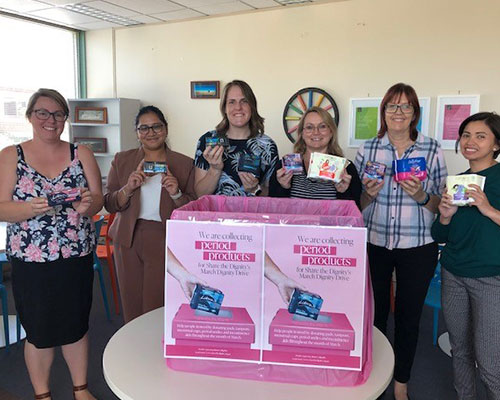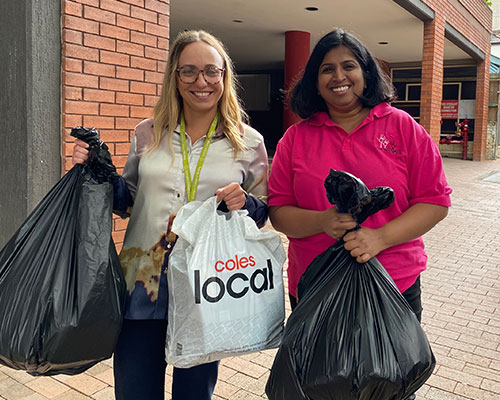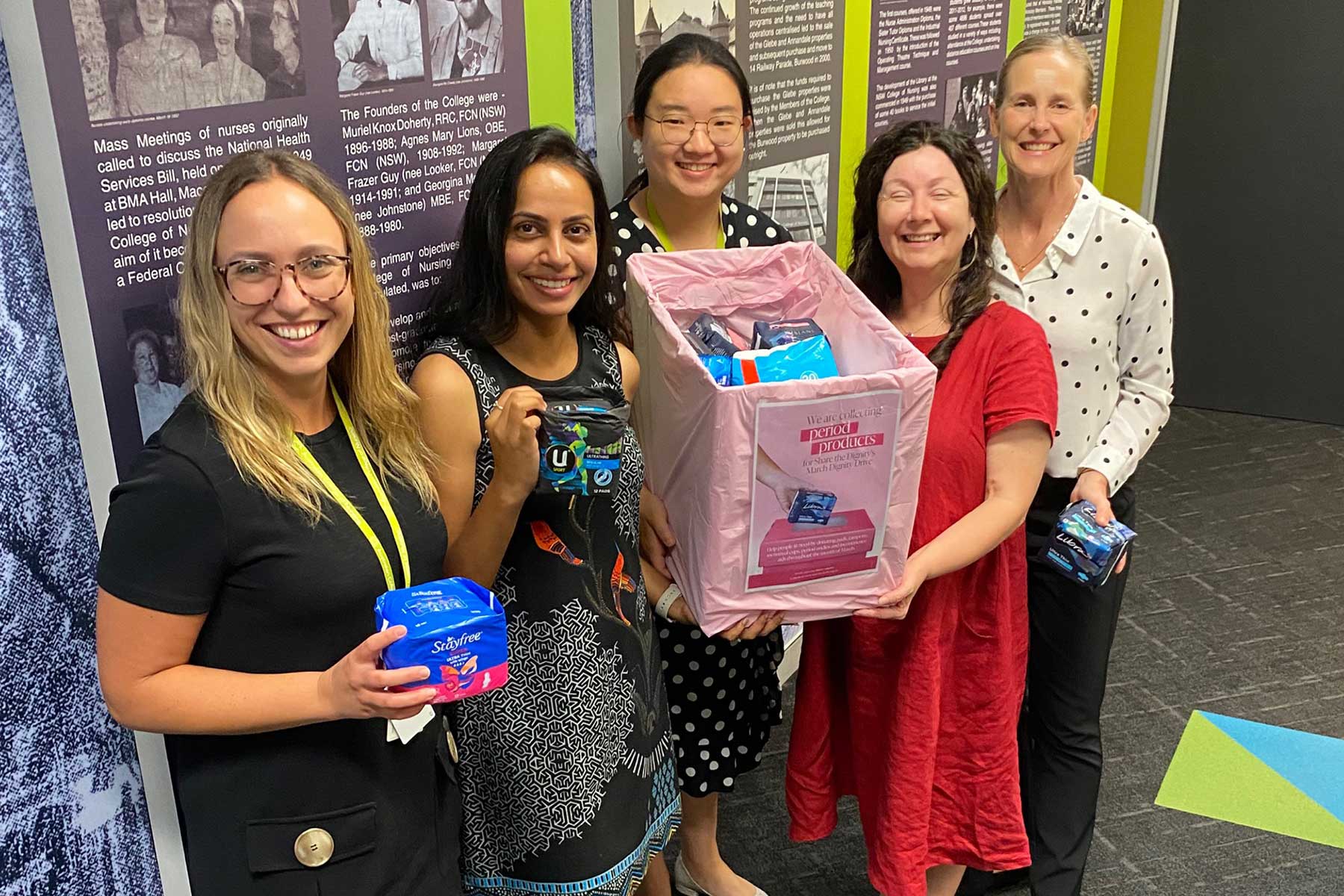Featured Image: Nurse Educators from the Australian College of Nursing (ACN) Sydney Office with donations to the Share the Dignity Dignity Drive. Source: Sharron Smyth-Demmon MACN
Author’s note: readers, please note that this article has mentions of intimate partner and family violence. If you find the content distressing, resources are available at the end of the article for expert support.
Across the month of March, organisations across the country, including the Australian College of Nursing (ACN), host boxes for donations of period products to support those in need. The Dignity Drive, hosted by charity Share the Dignity, distributes the period products to people who need the products but are unable to access them.
As a for-purpose organisation on a mission to provide inclusive and accessible care for all Australians, the cause touches the heart of many who work at ACN. We are firm believers that access to menstrual health is a right, not a privilege, and period products exist to ensure the dignity and sanitation of all people who menstruate.
The March 2023 campaign ran across our Sydney and Canberra offices, with the donation boxes collecting over 100 period products. Donations included pads, tampons, incontinence pads and reusable period products.
In total, the donations will support over 100 people to access dignity and support throughout their period so they can focus on what is most important – keeping themselves and their families safe and secure.

Image: ACN Staff at the Canberra office show some of the donations brought in over March. Source: Karen Dansey FACN (Hon)
Why is the Dignity Drive needed?
According to the 2021-22 Personal Safety Survey, released in 2023 by the Australian Bureau of Statistics, one in five women have experienced sexual violence and one in three have experienced physical violence since the age of 15 (Australian Bureau of Statistics, 2023).
As intimate partner and family violence occurs overwhelmingly against women and children, women are much more likely to be the partner fleeing the relationship. Women are most at risk of violence and death in the first three months after separation from a violent partner, and often must seek safety in a shelter or on their own.
The last thing on your mind when you are securing the safety of yourself, your children and pets is your period, and the Dignity Drive steps in so menstrual health is set and ready to forget.
However, it is not just women fleeing intimate partner and family violence. With the cost of living biting all Australian families, more families are struggling to stretch their pay to make sure everyone is fed and healthy. By providing access to period products in places like libraries, schools, public hospitals, Aboriginal Health Services and refuges, people experiencing period poverty will no longer need to choose between surviving and dignity.
As nurses are often the first health professionals many will interact with in Australia’s health systems, we are well acquainted with experiences of how period poverty affects our consumers’ health.
In the Share the Dignity campaign #PadUpPublicHealth, the charity found countless experiences of lack of access to period products in hospitals. Submissions to the campaign found many nurses and midwives were giving up their own supplies to support consumers (Share the Dignity, 2022).
This does not surprise us – we know nurses are compassionate and competent and will do what needs to be done for consumers to receive the best care. However, we will take options where possible to undertake preventative care and are proud to donate to the cause.

Image: ACN Nurse Educator Kirsten Masters MACN (left) with Share the Dignity volunteer Ajetha Ullal (right) to pass on the donations from the Sydney Office. Source: Sharron Smyth-Demmon MACN
Where do the products go?
While no organisation gets a detailed list of where each donated period product goes, products are distributed by Share the Dignity across Australia where they are needed most. Charities, homeless hubs, Aboriginal Health Centres, libraries, public hospitals and community centres are among many of the locations where products are distributed.
In our local areas of Sydney and Canberra, the impact can already be felt on the ground for many in the community. Period products for the Dignity Vending Machines are now available in several health and community services, such as Westmead Hospital and Auburn Hospital in Western Sydney.
The campaign does not just support hospitals, but also health services across the country. Donations are given to people all over Australia, including to our First Nations colleagues and consumers at the Winnunga Nimmityjah Aboriginal Health & Community Services near the ACN office in Canberra.
Each donation makes a difference, not just in the lives of people doing it tough with cost-of-living pressures in the cities, but in regional, rural and remote areas of Australia.
Products find their way to the most rural and remote locations of Australia, including Mt Isa in Queensland and Leonora in Western Australia. For those unable to access the Dignity Vending Machines, products are donated directly to charities, refuges and not-for-profits working directly with consumers who need access to them.
Access is a right, not a privilege for people who menstruate and we encourage all nurses, organisations and groups interacting with the general public to look into how they can better support access and education around menstrual health.
Thank you to everyone who donated to the March Dignity Drive and to Sharron Smyth-Demmon MACN and Karen Dansey FACN (Hon) for their organisational support.
Share the Dignity’s #DignityDrive
The #DignityDrive led by Share the Dignity is a biannual drive to collect period products for people who are experiencing period poverty. The drives run in March and August and more information can be found at Share the Dignity.
Find out more about ACN’s work supporting accessible and inclusive health care on our website.
If the contents of this article have caused distress, please seek help and guidance with:
- 1800 RESPECT (1800 737 732)
- Women’s Crisis Line: 1800 811 811
- Men’s Referral Service: 1300 766 491
- Indigenous Women’s Legal Centre: 1800 639 784
- QLife: 1800 184 527
- DV Connect Mensline: 1800 600 636
- Lifeline (24-hour crisis line): 131 114
Please call 000 if you are in an emergency.





